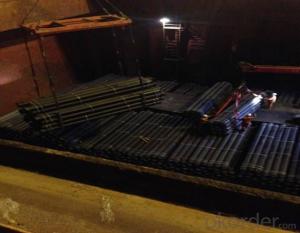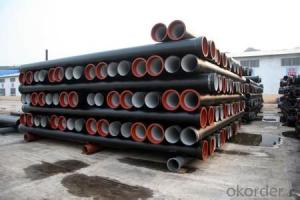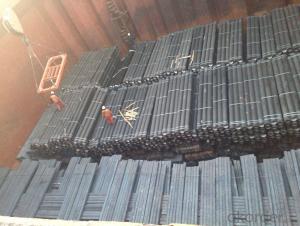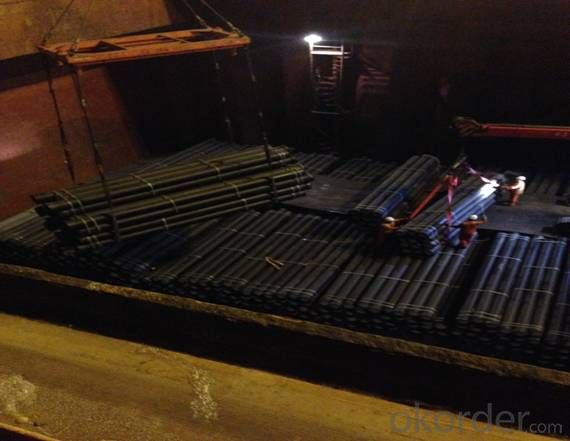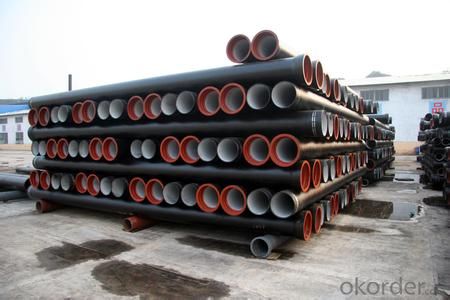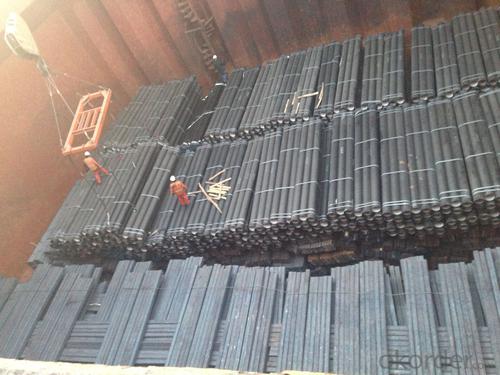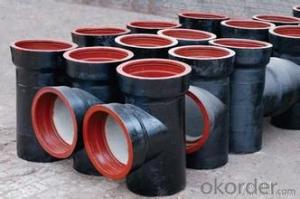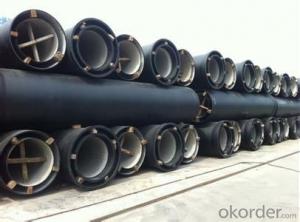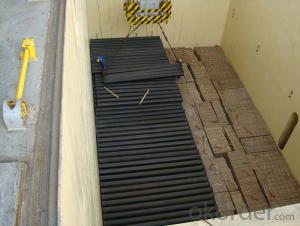DUCTILE IRON PIPE K9 DN1400
- Loading Port:
- China Main Port
- Payment Terms:
- TT OR LC
- Min Order Qty:
- -
- Supply Capability:
- -
OKorder Service Pledge
OKorder Financial Service
You Might Also Like
Ductile Iron Cast Pipe is without any defects compare with tradition casting tech, which has many advantages particularly as follow:
(1) High density. In the "vertical upward casting" process, the melt iron of centre liquid column in center crystallizer is continuously feeding for volume shrinkage caused by condensation tube at outer circumference , which lead to be free of shrinkage porosity.
(2) High purity. When melt iron pouring, the mixed impurities such as gas, dross, sand grain which are lighter than melt iron could be eliminated at furnace mouth, its impossible to enter into the crystallizer through the channel, so the melt iron into the crystallizer is very pure.
(3) Strength with toughness. The cooling speed provided by continuous crystallizer is 30 times than sand casting and 5 times than centrifugal casting, and doesn't produce white iron, the eutectic cell volume of continuous cast iron is one eighth to one tenth compare with traditional cast iron. The density of graphite nodule in ductile iron can reach 300-700 pcs/mm2. Therefore, all reason above improve the strength and toughness of continuous cast iron.
(4) Free machining. The high speed cooling make the hardening phase (such as boride, steadite) not appear like reticular, massive or thick, but diffuse like fish bone and pane in shape, moreover, there are tiny graphite flakes inlaid hardening phase. It's free machining in BrinellHardness the range of 250-300HB. However, the Brinell Hardness of 250 is top limit to common metal materials.
(5) Uniform composition of tube wall. The convection mixing of liquid column caused by marching type drawing in crystallizer make the composition of tube wall well-distributed, and concentration gradient very little.
(6) High productivity. To the wall thickness of tube under 10mm, the speed of continuous casting is 1 meter/min, to the wall thickness of tube under 20mm, the speed of continuous casting is 0.5 meter/min, which is high efficiency that centrifugal or other casting tech couldn't reach.
- Q: Are ductile iron pipes suitable for horizontal auger boring installations?
- Yes, ductile iron pipes are suitable for horizontal auger boring installations. Ductile iron pipes have excellent strength and durability, making them ideal for underground installations. They can withstand the lateral forces and vibrations involved in auger boring, ensuring a reliable and long-lasting pipeline system.
- Q: Ductile iron pipes perennial bubbles in the water will rot it
- From the hydraulic performance, because ductile pipe specifications generally refers to the inner diameter of PE pipe diameter specifications generally refers to the same specifications, because under the condition of ductile pipe can achieve greater runoff; from the installation and maintenance cost, ductile pipe have more favorable price. The inner wall of zinc spray, anti-corrosion materials such as cement mortar, ductile iron pipe perennial bubbles in the water will not be rotten.
- Q: Can ductile iron pipe be used for water treatment plants?
- Yes, ductile iron pipe can be used for water treatment plants. Ductile iron pipes are known for their strength, durability, and corrosion resistance, making them suitable for transporting water and other fluids in various industrial applications, including water treatment plants.
- Q: Can ductile iron pipes be used for pressure reducing stations?
- Ductile iron pipes are indeed capable of being utilized in pressure reducing stations. Renowned for their robustness and resilience, these pipes are well-suited for managing applications involving high pressure. Their exceptional resistance to corrosion allows them to endure the mechanical pressures and strains typically associated with pressure reducing stations. Moreover, the smooth interior surface of ductile iron pipes minimizes friction losses and contributes to maintaining a consistent and regulated pressure within the system. Consequently, it can be concluded that ductile iron pipes are a dependable and frequently employed material in pressure reducing stations.
- Q: How can the ductile iron pipe depress the elbow so as to prevent it from being opened?
- Elbow materials are cast iron, stainless steel, alloy steel, malleable cast iron, carbon steel, nonferrous metals and plastics.
- Q: What are the typical joint restraint requirements for ductile iron pipes under pressure?
- The typical joint restraint requirements for ductile iron pipes under pressure include the use of mechanical joint restraining devices such as bolts, gaskets, and thrust blocks. These restraints are necessary to prevent the pipes from separating or moving due to the internal pressure of the fluid being transported. Additionally, proper alignment and anchoring of the pipes are essential to ensure the integrity and stability of the pipeline system.
- Q: Can ductile iron pipes be used for underground utilities?
- Yes, ductile iron pipes can be used for underground utilities. Ductile iron pipes are known for their durability, strength, and resistance to external pressure. This makes them a suitable choice for underground applications where the pipes need to withstand heavy loads, such as those found in utility installations. Ductile iron pipes are also resistant to corrosion, which is important for underground environments where the pipes are exposed to moisture and soil conditions. Additionally, these pipes have a longer service life compared to other materials, reducing the need for frequent replacements and maintenance. Therefore, ductile iron pipes are commonly used for underground utilities such as water distribution, sewage systems, and gas pipelines.
- Q: Can ductile iron pipes be used for large-scale irrigation systems?
- Ductile iron pipes are ideal for large-scale irrigation systems due to their strength, durability, and corrosion resistance. They can withstand high pressure and meet the demands of extensive irrigation. Furthermore, these pipes have a long lifespan, minimizing the need for frequent maintenance and replacements. In addition, they are cost-effective when compared to alternative materials used in irrigation systems. Consequently, ductile iron pipes are a prudent choice for large-scale irrigation systems, given their strength, durability, corrosion resistance, and cost-effectiveness.
- Q: Can ductile iron pipes be used for underground wastewater outfalls?
- Yes, ductile iron pipes can be used for underground wastewater outfalls. Ductile iron is a strong and durable material that can withstand the harsh conditions of underground installations, making it suitable for transporting wastewater efficiently and reliably.
- Q: Can ductile iron pipes be used for trenchless installations?
- Indeed, trenchless installations can utilize ductile iron pipes. Horizontal directional drilling (HDD) and pipe bursting techniques have gained considerable popularity as alternatives to the conventional open-cut trenching method for underground utility installations. Ductile iron pipes possess the necessary qualities of strength, durability, and flexibility, rendering them suitable for trenchless installations. They can endure the formidable forces encountered during HDD and pipe bursting operations without jeopardizing their structural integrity. Moreover, ductile iron pipes exhibit remarkable resistance to corrosion, establishing them as a dependable option for trenchless applications.
Send your message to us
DUCTILE IRON PIPE K9 DN1400
- Loading Port:
- China Main Port
- Payment Terms:
- TT OR LC
- Min Order Qty:
- -
- Supply Capability:
- -
OKorder Service Pledge
OKorder Financial Service
Similar products
Hot products
Hot Searches
Related keywords
